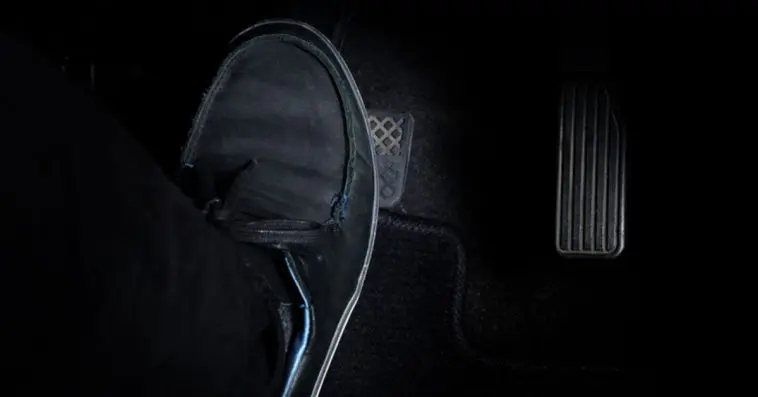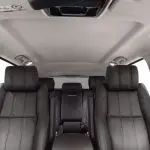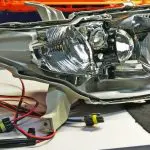While I do not drive much myself, I do know that my car is not supposed to shake when I brake. So, when I felt my car shake I knew there was something wrong.
I took it upon myself to research the issue and document it. If you are in the same place like me, you are on the right page.
Coming to the question, “Why does my car shake when I brake?”, the braking system may be to blame. In the case of cars with disc brakes, the shaking happens due to a warped rotor.
For drum brakes, it is the out of round drums that cause the vibration. That said, there are more reasons why my car is shaking while applying brakes.
There are a few more issues associated with a shaking car that doesn’t involve a braking system.
Worn out tires, bent rims, loosened lug nuts, etc can also be the reason why my car is shaking.
TABLE OF CONTENTS
Why Is My Car Shaking?
Eric Charles, a certified mechanic from the mid-west US says, “So if your car shakes only when it brakes, the first place to look is at the brakes themselves.
Most often that’s where you’ll find the problem.” To understand this issue, it is important that I learn more about brakes and rotors.
How Do Brakes Work?
In layman terms, brakes slow down my car by hindering the wheel’s ability to turn. By curbing the wheel, the car eventually slows down.
Most present-day cars, use disc brakes but few go with drum brakes, especially for the back wheels.
In cars fitted with disc brakes, the rotor is a disc linked to the wheel. The rotor has a “caliper” which is basically a piece of clamping equipment and a brake pad within it.
The combination of the rotor and the wheel rotates smoothly till the driver applies the brakes.
The hydraulic pressure caused by the brakes drives the brake pad into the disc, which slows the car.
More pressure causes the brake pad to clamp tight on the disc, stopping the car.
Coming to drum brakes, it is a empty metal drum coupled with the wheels.
When the driver applies pressure, the hydraulic fluid pushes the shoes inside the drum into contact with the inner circumference.
Again, additional pressure results in the shoes being pressed into the drum which further slows the car.
What Causes Warped Rotors?
The wheel works in conjunction with the rotors to slow down my car. The brake pad in the rotor presses against it to prevent the wheel from spinning.
Sometimes the rotors get out of balance and that causes vibrations that are felt in the brake pedal and the steering wheel.
- Warping occurs due to many reasons and the most important of them is the lifetime. Every time I brake, some of the matter is removed from the rotors.
After a lifetime of usage, the rotors tend to get thinned out. Even normal braking can cause friction heat due to the brake pad gripping on the rotor. A thinned out rotor cannot handle the heat resulting in more damage. - If this is the case with normal braking, doing it in a mountainous area where I brake continuously, will heat the rotors.
Overheating causes the rotors to warp. Warped rotors can create the pulsation when I press on the brake pedal. - Another reason for warped rotors is front calipers not retracting after braking. Continuous contact causes overheating which eventually results in warping.
But this happens in cars with more mileage, where rust blocks the calipers from retracting. - My rotor can also get warped when more metal is removed from the rotor after a brake job.
Rotors, both discs, and drums have a minimum thickness that has to be maintained. If it gets thinner, the poor heat transfer happens, resulting in warped rotors. - Another surprising reason that is contrary to all the above is the lack of usage for a long period of time.
When a car sits idle for too long, the space on the rotor where the brake pad sits can corrode or rust. The resultant effect is similar to that of a warped motor, though in this case, restoring it to flatness is difficult.
What Happens If I Drive With A Warped Rotor?
If I discover that my rotor is warped, is it safe to take to the roads or highways? The answer to this is a massive ‘No’ since my car may not stop in an emergency.
Imagine not being able to stop in a driving situation for a pedestrian or even to avoid a car accident.
Although warped rotors are common, not everyone knows how to check for a warped rotor.
Here are some classic signs of a warped rotor:
- My brake tends to give a grinding noise initially when applied. For some time, the sound was irritating until I realized that my brake is compromised. The sound is caused by the brake pads working on an uneven rotor surface.
- Brakes also vibrate when pressure is exerted and can be felt on my brake pedal. When I finally heard the sound it is a final note from my car, that the brake is weakened.
The rotor surface has thinned out and the inability to dissipate heat has caused the rotor to overheat. - Rotors can be spotted through the wheel wells. So, if I cannot spot the brake pad in the wheel well, it is time to visit the mechanic. The rotor can be spotted in the wheel well by turning the wheels to the extreme right or left.
Is a warped rotor such a debilitating condition for my car? Actually it is and this is what happens if I decide to continue driving with a warped rotor.
- The vibration and the shaking of brake pads cause the baking fluid to foam which in turn can stop the braking system to receive proper hydraulic pressure. This can result in loss of brake control albeit temporarily which might turn to be dangerous.
- When driving in snow, I tend to apply brake often and with a warped rotor, my car can shudder, reducing traction which can be costly in the long run.
- If I continue to drive with warped rotors, my ABS gets degraded and thereby costing me much more than to get my warped rotor repaired.
- With a warped rotor, the time to stop increases which is dangerous in slippery conditions like snow.
How Much Does It Cost To Replace My Rotor?
A braking system of any vehicle needs to be in top shape since it guarantees your safety and the safety of the others.
It is safer and cost-effective to get your brake repairs done from time to time.
There is no exact pricing as to how much your rotors and brake pads cost since it depends on the location and brand.
Go to one of my articles that explains the best brake pads!
Rotors cost $30 to $75 each wheel while a brake pad costs $35 and $150 for all four wheels. The labor differs from state to state and generally depends on the mechanic.
The actual cost of your brake, rotor, brake pad, etc depends on the following factors. However, it doesn’t hurt to ask around for a better quote and pricing.
- Brand of Car: Parts for American-made and Japanese-made doesn’t cost much and the labor cost is also not as high.
European models like Audi, BMW, Mercedes, and Jaguars on the other hand costs more. Same with their labor costs since the vehicle systems are different from that of the former. - Type of Car: Make and model of the car would also affect the pricing. For example, the cost of a rotor for a pickup truck would be more compared to that of a family car.
This is in addition to the increase in labor costs on account of the difference in materials and the time taken. - Variety of Materials: Brake pads may be ceramic, semi-metallic, and organic. The difference in materials accounts for the difference in price tags.
Then again, a brake pad from a premium brand costs more than an off the market brand and an original part costs the most. - Kind of Driving: While this doesn’t directly relate to the cost, the braking system for a heavy-duty vehicle must be of premium quality to give the performance demanded from it. Hence, the price increases exponentially.
However, this all changes if I go by the DIY route. To begin with, I have to learn to change the pads, rotors, etc myself, but I can save a significant amount of money.
What May Be The Other Reasons?
I expect my vehicle to run smoothly and without any issues. Anything out of ordinary is a cause of concern and is a direct result of a malfunction.
While rotors are to blame for the car shuddering when I brake, it is not always the case. It might be one of the below:
- Tires Misalignment: Tires Misalignment is another common cause for the vibration when braking, especially when my speed is at 80km/h. Misalignment leads to various other issues, so it is better to get a mechanic to give a full inspection.
- Steering & Suspension Issues: The wheel bearings, ball joints, and tie rods can wear out during the car’s lifetime, and the car shudders.
It can happen at any time when I drive, especially when attempting to turn the wheel. In this case, it is the suspension and steering issues. - Over Tightening the Front-Wheel Lugs: According to Bell Performance, over-tightening the front wheel lugs look to be an important issue when it comes to the car shaking when applying brakes.
Wheel lugs are tightened with a torque wrench in order to place the same tension in all the nuts. But sometimes, this can let the front-wheel lugs to be tightened much more than needed and cause the rotor to warp.
Also, remember not to use the pneumatic impact wrench as this tends to overtighten the lug nuts. - Rough Brake Rotor: Brake rotor tends to wear down unevenly depending on vehicle usage.
This inconsistency causes the steering wheel and brake pedal to shake and shudder when braking particularly when driving on a highway or highway speeds. - Brake Pad Wear and Tear: Over the years, the brake pad tend to get coated with dirt, grime, and oils which vibrate when pressure is applied.
This warps the brake pad and usually, the vibration is accompanied by a high-pitched whining noise. However, replacing the brake pad can clear this issue.
Frequently Asked Questions
Q1: Why Does My Car Stop While Driving?
There quite a few reasons for my car to stop when driving, the most important of which is the crankshaft sensor. This, when defective causes the car to stop.
A faulty fuel pump when not providing enough fuel to the engine also results in the car shutting off.
In the same line, a clogged fuel filter and an empty fuel tank can also result in the car stopping.
Q2: Why Does My Car Shake When I Accelerate?
An engine mount connects the car and the engine, while safely absorbing the vibrations. When the engine is not mounted properly, the car is likely to vibrate at high speeds.
On the contrary, misaligned steering and suspension system can make the steering wheel vibrate when accelerating.
Q3: Why Does My Car Pull To The Left When I Brake?
Issues with the braking system like a leaking wheel cylinder, a worn-out brake pad, a frozen caliper, a restricted brake hose, or an issue with a component in the braking system can pull the car to the left.
But a faulty suspension, uneven tire pressure, and improper wheel alignment can also be the reasons.
Conclusion
There are so many issues I need to consider when it comes to my car shaking.
While a warped rotor seems to be the most possible issue, a brake pad wear, wheel misalignment, uneven brake rotor, suspension issues and more can also be the causes.
Whatever it is, a mechanic or a service dealer should be able to hone in on the right issue. But, if it is a warped rotor, can I drive it until I can get it repaired or replaced?
Absolutely not; Perform a check to see if it is a warped rotor and if it is, I should retire my car until I can get it to a mechanic.




